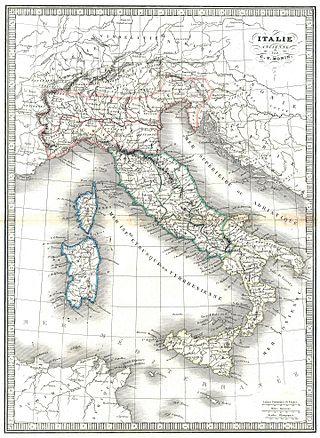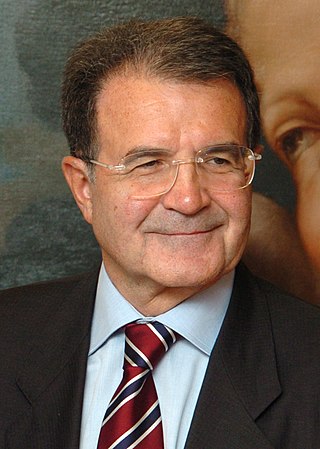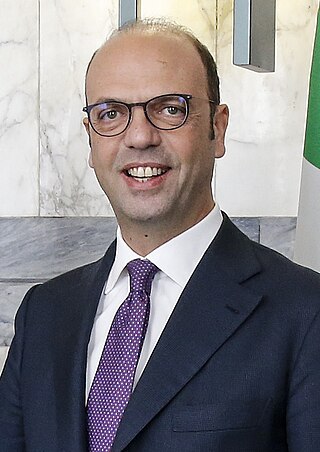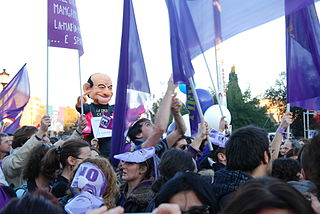
Francesco Maurizio Cossiga was an Italian politician. A member of Christian Democracy, he was prime minister of Italy from 1979 to 1980 and the president of Italy from 1985 to 1992. Cossiga is widely considered one of the most prominent and influential politicians of the First Italian Republic.

Silvio Berlusconi was an Italian media tycoon and politician who served as the prime minister of Italy in four governments from 1994 to 1995, 2001 to 2006 and 2008 to 2011. He was a member of the Chamber of Deputies from 1994 to 2013; a member of the Senate of the Republic from 2022 until his death in 2023, and previously from March to November 2013; and a member of the European Parliament (MEP) from 2019 to 2022, and previously from 1999 to 2001. With a net worth of US$6.8 billion as of June 2023, Berlusconi was the third-wealthiest person in Italy at the time of his death.

Forza Italia was a centre-right liberal-conservative political party in Italy, with Christian-democratic, liberal, social-democratic and populist tendencies. It was founded by Silvio Berlusconi, who served as Prime Minister of Italy four times.

Democracy is Freedom – The Daisy, commonly known simply as The Daisy, was a centrist political party in Italy. The party was formed from the merger of three parties within the centre-left coalition: the Italian People's Party, The Democrats and Italian Renewal. The party president and leader was Francesco Rutelli, former mayor of Rome and prime ministerial candidate during the 2001 general election for The Olive Tree coalition, within which The Daisy electoral list won 14.5% of the national vote.
Liberalism and radicalism have played a role in the political history of Italy since the country's unification, started in 1861 and largely completed in 1871, and currently influence several leading political parties.

The history of the Italian Republic concerns the events relating to the history of Italy that have occurred since 1946, when Italy became a republic after the 1946 Italian institutional referendum. The Italian republican history is generally divided into two phases, the First and Second Republic.

The 2006 Italian general election was held on 9 and 10 April 2006. Romano Prodi, leader of the centre-left coalition The Union, narrowly defeated the incumbent Prime Minister Silvio Berlusconi, leader of the centre-right coalition House of Freedoms. Initial exit polls suggested a victory for Prodi, but the results narrowed as the count progressed. On 11 April 2006, Prodi declared victory; Berlusconi never conceded defeat and an ensuing dispute formed.

Enrico Letta is an Italian politician who served as Prime Minister of Italy from April 2013 to February 2014, leading a grand coalition of centre-left and centre-right parties. He was the leader of the Democratic Party (PD) from March 2021 to March 2023.

Nicola Zingaretti is an Italian politician who served as President of Lazio from March 2013 to November 2022 and was Secretary of the Democratic Party from March 2019 until March 2021.

Angelino Alfano is an Italian former politician who served as Minister of Foreign Affairs from 12 December 2016 to 1 June 2018.

The Italian General Confederation of Labour is a national trade union centre in Italy. It was formed by an agreement between socialists, communists, and Christian democrats in the "Pact of Rome" of June 1944. In 1950, socialists and Christian democrats split forming UIL and CISL, and since then the CGIL has been influenced by the Italian Communist Party (PCI) and until recent years by its political heirs: the Democratic Party of the Left (PDS), the Democrats of the Left (DS) and currently the Democratic Party (PD).

The People of Freedom was a centre-right political party in Italy. The PdL launched by Silvio Berlusconi as an electoral list, including Forza Italia and National Alliance, on 27 February for the 2008 Italian general election. The list was later transformed into a party during a party congress on 27–29 March 2009. The party's leading members included Angelino Alfano, Renato Schifani, Renato Brunetta, Roberto Formigoni, Maurizio Sacconi, Maurizio Gasparri, Mariastella Gelmini, Antonio Martino, Giancarlo Galan, Maurizio Lupi, Gaetano Quagliariello, Daniela Santanchè, Sandro Bondi, and Raffaele Fitto.

The Purple People was an Italian mass protest movement who, among other things, called for the resignation of now former Prime Minister Silvio Berlusconi. The movement was disaffected with mainstream Italian politics, and identified themselves at demonstrations and rallies by wearing items of the colour purple, chosen because it was not associated with any major Italian political party. The group originated in October 2009 when a group of bloggers, gravitating around the anonymous figure of "San Precario", an activist from Catania, Sicily, organised demonstrations using word of mouth, Twitter and Facebook.
Generation Italy or Finiani was an association connected to Future and Freedom (FLI), a political party in Italy, and earlier to The People of Freedom (PdL).
New Italy Foundation is a national and socially-conservative think tank in Italy.
On 15 October 2011 about 200,000 people gathered in Rome, Italy to protest against economic inequality and the influence of the European Commission, the European Central Bank, the International Monetary Fund on politics and also against the government of Silvio Berlusconi. The protests began in solidarity with the Spanish protests. Many other protests occurred in other Italian cities the same day.

Beatrice Lorenzin is an Italian politician belonging to the Democratic Party, former leader of Popular Alternative, and former Minister of Health from 28 April 2013 to 1 June 2018, in the governments of Enrico Letta, Matteo Renzi and Paolo Gentiloni. In 2018 she became one of the longest-serving health minister in the history of the Italian Republic.

Forza Italia is a centre-right political party in Italy, whose ideology includes elements of liberal conservatism, Christian democracy, liberalism and populism. FI is a member of the European People's Party. Silvio Berlusconi was the party's leader and president until his death in 2023. The party has since been led by Antonio Tajani, who had been vice president and coordinatior and now functions as secretary. Other leading members include Elisabetta Casellati.

The Sardines movement, also known as Sardines against Salvini, was a grassroots political movement, which began in Italy in November 2019.
Between 2020 and 2022 hundreds of people from all over Italy protested against COVID-19 regulations. The protests ended with the abolishment of the majority of restrictions in June 2022. After the 2022 Italian general election in September, the remaining restrictions were removed completely by the Meloni Cabinet after Giorgia Meloni began serving as Prime Minister in October 2022.













